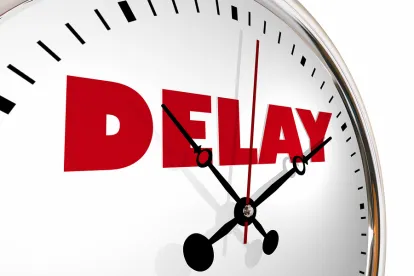On August 16, 2018, the Federal Circuit held that the one-year time bar under 35 U.S.C. § 315(b) for initiating Inter Partes Review (IPR) proceedings challenging validity of a patent is triggered by service of a complaint, regardless of whether that complaint is later dismissed “without prejudice.” Click-To-Call Technologies LP v. Ingenio Inc. et al., No. 2015-1242 (Fed. Cir. August 16, 2018). Even though the case was before a three-judge panel, the ruling on the time bar question was endorsed 10-2 by the Court, en banc, in a footnote.
The opinion in Click-To-Call is one of the first to review the application of § 315(b) following the recent holding in Wi-Fi One, LLC v. Broadcom Corp., 878 F.3d 1364, 1367 (Fed. Cir. 2018) (en banc) allowing for appeals of time bar determinations. Specifically, the Federal Circuit held that “the text of § 315(b) clearly and unmistakably considers only the date on which the petitioner, its privy, or a real party in interest was properly served with a complaint.” Click-To-Call, No. 2015-1242, slip op. at 17. The Court reasoned that “a defendant served with a complaint as part of a civil action that is voluntarily dismissed without prejudice remains ‘served’ with the ‘complaint,’” and, thus, remains subject to the time bar of § 315(b). Id., slip op. at 24. “It is impossible to square Wi-Fi One’s ‘cannot be rectified’ and ‘in no event’ language with the possibility that subsequent events in the civil action might operate to ‘nullify’ service of the complaint for the purpose of § 315(b)’s time bar.” Id., slip op. at 14.
Also of note is that the lawsuit triggering the time bar in the Click-To-Call case was filed in 2001 and voluntarily dismissed without prejudice in 2003—ten years prior to the America Invents Act (AIA) becoming effective. Thus, a lawsuit settled pre AIA could result in a bar to filing an IPR.
The opinion reverses prior holdings by the Patent Trial and Appeal Board (PTAB) that dismissal of an infringement lawsuit “without prejudice” did not trigger the one-year time bar. See, e.g., Universal Remote Control, Inc. v. Universal Electronics, Inc., IPR2013-00168, Paper 9, p. 6 (PTAB 2013) (citing Macauto U.S.A. v. BOS GmbH & KG, IPR2012-00004, Paper 18, pp. 15-16 (PTAB 2013)). The PTAB itself had relied on Federal Circuit precedent regarding the effect of dismissing a lawsuit without prejudice as leaving the parties “as though the action had never been brought….” See, e.g., Graves v. Principi, 294 F.3d 1350, 1356 (Fed. Cir. 2002) and Bonneville Associates, Ltd. Partnership v. Baram, 165 F.3d 1360, 1364 (Fed. Cir. 1999). The Court in Click-To-Call, however, distinguished these earlier cases as being inapplicable to the issue of the “clock-starting legal effect” of serving a civil court complaint relative to initiating an administrative proceeding. Click-To-Call, No. 2015-1242, slip op. at 5-9. Instead, the Court focused on the precise language in the statute, specifically that the one year time bar begins when the complaint for patent infringement is “served.”





 />i
/>i
